Description
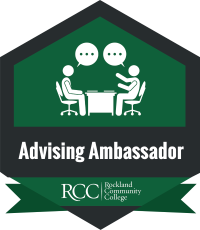
Upon successful attainment of the Advising Fundamentals I and II skills badges, the Advising Practice I and II skills badges, and the Degree Works skills badge, a participant will be awarded the Advising Ambassador microcredential.
Participants will learn basic academic advising concepts and the connection to student retention and degree completion. Participants will also learn RCC specific policies relevant to Academic Advising, in the areas of Admissions, Records and Registration, Assessment and Placement, Accessibility Services, Student Accounts, and Financial Aid.
Additionally, participants will become familiar with State and Federal policies and regulations, including, but not limited to NACADA, NACE, SUNY, and FERPA standards.
Participants will learn department and degree specific policies relevant to advising and attend the Degree Works Basics course. Participants will also learn the basics of transfer and career advising as well as learn about on and off campus resources that promote student success.
Participants will apply this knowledge to real advisement scenarios in both a classroom and practicum environment.
NOTE: Participants who earn this credential will be eligible to advise students for both Student Success and/or their academic department. Advising Ambassadors will be eligible for employment as an Advising Ambassador when the Student Success Department or one of the Schools at the College advertises for such services.
Credit or Non-Credit: Non-Credit
Courses Required
Advising Fundamentals I
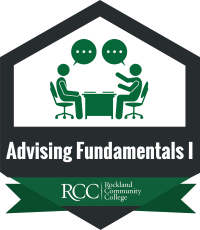
Description:
Participants will learn basic academic advising concepts and the connection to student retention and degree completion. Participants will also learn RCC specific policies relevant to academic advising, in the areas of Admissions, Records and Registration, Assessment and Placement, Accessibility Services, Student Accounts, and Financial Aid.
Additionally, participants will become familiar with State and Federal policies and regulations, including, but not limited to NACADA, NACE, SUNY, and FERPA standards.
Credit or Non-Credit: Non-Credit
Methods of Delivery: In-person, Online Synchronous
Outcomes:
- Participants will demonstrate an understanding of the importance of advising leading to academic success, student retention, degree completion, and career readiness
- Participants will understand RCC specific policies as they relate to advising from the following areas: Admissions, Records/Registration, Assessment and Placement, Advisement and Financial Aid. Participants will also be proficient in technologies required to advise students in a both a virtual and in-person format
Skills:
- Basic academic advising methods and strategies
- Banner/Self Service proficiency
- Participants will be proficient in technologies required to advise students in a both a virtual and in-person format
- Participants will develop the ability to adapt skills learned in both individual and small group advisement sessions
Outcomes Assessment:
- Pre and post survey assessment
- Content quiz
Advising Fundamentals II
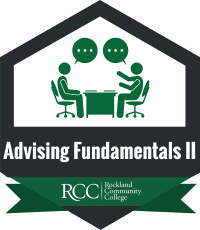
Description:
Participants will continue to develop basic academic advising concepts. Participants will also learn internal policies regarding Academic Standing, Special Populations, and degree program requirements.
Participants will learn the fundamentals of transfer and career advising. To engage and promote student success, participants will become familiar with academic and non-academic resources, including Accessibility Services, Student Involvement, TRiO, Veterans Affairs, the Connection Center, and the Tutoring Center.
Credit or Non-Credit: Non-Credit
Methods of Delivery: In-person, Online Synchronous
Outcomes:
- Participants will understand the importance of advising leading to academic success, student retention, degree completion, and career readiness
- Participants will demonstrate knowledge of internal procedures relevant to advising special populations, and specialized degree programs
- Participants will identify academic and non-academic campus resources, and refer students as determined appropriate
- Participants will demonstrate competency in Self-Service Banner and other software programs utilized for academic advising
Skills:
- Multi-faceted academic advising methods and strategies
- Competency in Self-Service Banner and other software programs utilized for academic advising
- Basic career and transfer advising methods and strategies
Outcomes Assessment:
- Pre and post survey assessment
- Content quiz
Advising Practice I
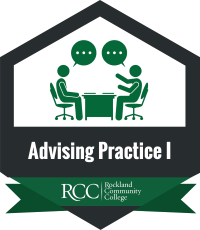
Description:
Participants will analyze several real-world advising scenarios and apply the knowledge they have gained from Advising Fundamentals I & II to strategize the best solutions for students.
Prerequisites: Advising Fundamentals I & II
Credit or Non-credit: Non-Credit
Methods of delivery: In-person, Online Synchronous
Outcomes:
- Participants will apply skills learned in Advising Fundamentals I & II to a wide range of realistic scenarios
- Participants will demonstrate adaptability of skills to both individual and small ground advisement sessions
- Participants will demonstrate proficiency in Self-Service Banner and other software programs utilized for academic advising
Skills:
- Academic advising methods and strategies
- Proficiency in Self-Service Banner and other software programs utilized for Academic Advising
Outcomes Assessment:
- Performance evaluation by Student Success Advisor
Advising Practice II
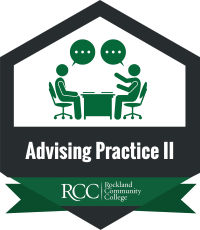 Description:
Description:
Participants will observe experienced advisors as they advise students for a minimum of five (5) hours. Following the completion of the five-hour minimum, they will be paired with an experienced advisor for continued assistance and professional development.
Prerequisite: Advising Practice I
Credit or Non-credit: Non-Credit
Modes of Delivery: In-person, Online Synchronous
Outcomes:
- Participants will observe experienced Student Success Advisors working with students for five (5) hours. Following the observation period, they will be paired with an experienced Student Success Advisor for continued professional development
Skills:
- Basic academic counseling techniques
- Banner/Self Service proficiency
- Participants will be proficient in technologies required to advise students in a both a virtual and in-person format
- Participants will develop the ability to adapt skills learned in both individual and small group advisement sessions
Outcomes Assessment:
- Performance evaluation by Student Success Advisor
Outcomes
- Participants who earn this credential will have an in-depth understanding of advisement theory and practice as well as the institutional policies affecting advisement at Rockland Community College
- Participants will be proficient in technologies required to advise students in a both a virtual and in-person format
- Participants will develop the ability to adapt skills learned in both individual, and small group advisement sessions
Skills
- Basic academic advising methods and strategies
- Banner/Self Service proficiency
- Participants will be proficient in technologies required to advise students in a both a virtual and in-person format
- Participants will develop the ability to adapt skills learned in both individual and small group advisement sessions
Outcomes Assessment
- Pre and post survey
- Content quiz
- Performance evaluation by Student Success Advisor
